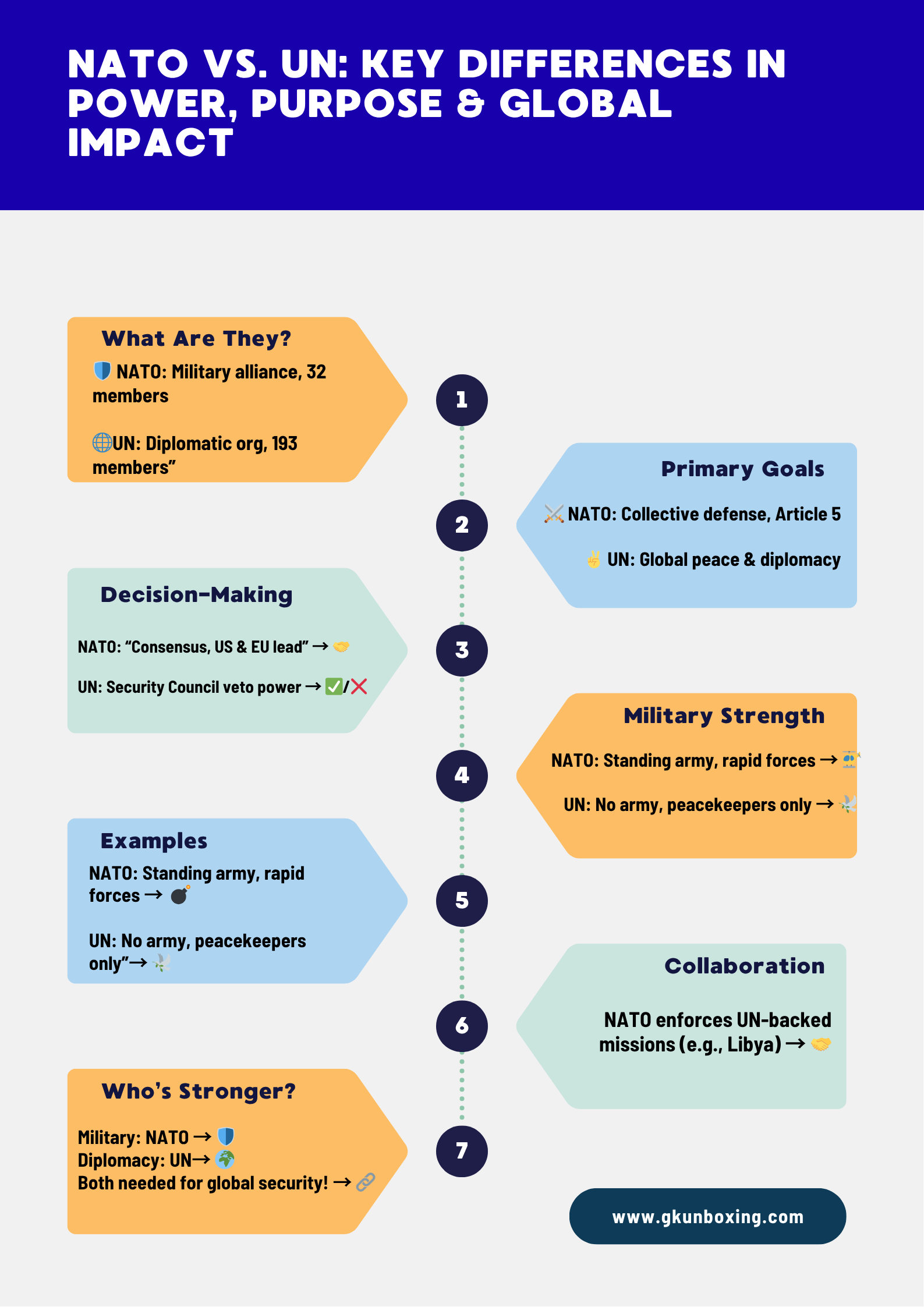NATO vs. UN: Key Differences in Power, Purpose & Global Impact
Introduction
The North Atlantic Treaty Organization (NATO) and the United Nations (UN) are two of the world’s most influential international organizations, yet they serve very different purposes. While both aim to promote global stability, their structures, functions, and decision-making processes differ significantly.
If you’ve ever wondered:
- What’s the main difference between NATO and the UN?
- Which organization has more military power?
- Can NATO and the UN work together?
This in-depth comparison will break down their roles, strengths, and limitations—helping you understand how each shapes global politics.
{tocify} $title={Table of Contents}1. What Is NATO?
- Founded: 1949 (Cold War era)
- Headquarters: Brussels, Belgium
- Members: 32 countries (as of 2024, including the U.S., UK, France, Germany)
- Primary Goal: Collective defense against military threats (Article 5).
Key Features of NATO:
- ✔ Military alliance – Focuses on defense and security.
- ✔ Binding commitments – An attack on one member is considered an attack on all.
- ✔ Led by Western powers – Dominated by the U.S. and European nations.
- ✔ Rapid response forces – Can deploy troops quickly in crises.
2. What Is the UN?
- Founded: 1945 (Post-WWII)
- Headquarters: New York City, USA
- Members: 193 countries (nearly every recognized nation)
- Primary Goal: Maintain global peace through diplomacy, humanitarian aid, and conflict resolution.
Key Features of the UN:
- ✔ Diplomatic platform – All countries have a voice.
- ✔ Peacekeeping (not fighting wars) – Sends neutral forces to conflict zones.
- ✔ Global humanitarian work – Runs agencies like WHO, UNICEF, UNHCR.
- ✔ No standing army – Relies on member contributions.
3. Key Differences Between NATO and the UN
| Aspect | NATO | UN |
|---|---|---|
| Type | Military alliance | Diplomatic & humanitarian organization |
| Membership | Selective (32 countries) | Nearly universal (193 countries) |
| Decision-Making | Consensus among members (U.S. has major influence) | Security Council (5 permanent members with veto power) |
| Military Power | Strong, unified forces | No standing army (relies on peacekeepers) |
| Primary Focus | Defense against external threats | Conflict prevention, human rights, development |
| Example of Action | Responding to Russian invasion of Ukraine (supporting Ukraine) | Sending peacekeepers to Congo or South Sudan |
4. Can NATO and the UN Work Together?
Yes, but in different ways:
- NATO provides military support (e.g., enforcing UN no-fly zones in Libya 2011).
- UN authorizes missions (e.g., NATO-led operations in Afghanistan were UN-backed).
- Both coordinate in crises (e.g., disaster relief, counter-terrorism).
However, tensions exist:
- NATO’s actions sometimes bypass the UN (e.g., Kosovo War 1999).
- Russia and China (UNSC members) often oppose NATO expansions.
5. Major Criticisms of NATO and the UN
NATO Criticisms:
- ❌ Seen as a U.S.-dominated alliance (ignores non-Western interests).
- ❌ Expansion provokes Russia (e.g., Ukraine conflict).
- ❌ Limited to North Atlantic region (not a true global force).
UN Criticisms:
- ❌ Inefficient bureaucracy (slow decision-making).
- ❌ Veto power abuse (Russia & U.S. block key resolutions).
- ❌ Peacekeeping failures (Rwanda genocide, Syria war).
6. Which Organization Is More Powerful?
- Militarily? NATO (has advanced forces & nuclear capabilities).
- Globally? UN (broader influence in diplomacy, health, refugees).
- Politically? Depends—UN has wider legitimacy, but NATO acts faster.
7. Conclusion: Do We Need Both?
✅ NATO is crucial for defense (deters large-scale wars).
✅ UN is essential for diplomacy (prevents conflicts through dialogue).
Final Verdict: They serve different but complementary roles in global security.
FAQs
Q: Can a country be in both NATO and the UN?
A: Yes! Most NATO members (U.S., UK, France) are also UN members.
Q: Has NATO ever fought the UN?
A: No, but NATO has acted without UN approval (e.g., Kosovo).
Q: Does the UN control NATO?
A: No—they are separate, but sometimes collaborate.
#NATO #UnitedNations #GlobalSecurity #MilitaryAlliance #Diplomacy


